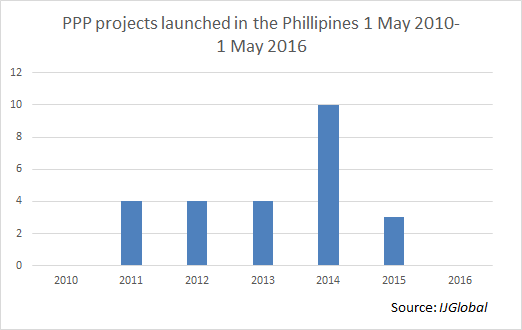Philippines: Aquino’s PPP legacy is a bulging pipeline
Under outgoing president Benigno Aquino, the Philippines has tendered out more PPP projects than the previous three presidents combined. But while 25 PPP projects have been launched during his five-year term, only five deals have crossed the finishing line to financial close.
With the presidential elections in the Philippines set for 9 May, IJGlobal reviews the PPP track record of President Aquino, whose term will officially end on 30 June.
PPP plans
Aquino had identified building up and plugging the infrastructure gap as a key priority of his economic programme. One pillar of that policy was the establishment of the Public-Private Partnership (PPP) Center.
The PPP Center, whose executive director is appointed directly by the president, was mandated to monitor and facilitate the execution of PPP projects in the Philippines. The Asian Development Bank (ADB) was taken on as adviser to help set up the PPP Center.
The PPP Center was tasked with training other relevant governments and agencies, funding feasibility studies, providing technical assistance on financial and economic viability studies, as well as advising on the preparation of bids.
With the president’s backing, the PPP Center has launched 30 projects over five years, IJGlobal data shows.
The agency’s ambitions could not be matched by execution however. To date only five projects - of a combined value of $1.71 billion - have managed to reach financial close.
Ambitions unfulfilled
One major challenge has been the length of time required to procure PPPs. At the end of 2010, the government pledged to launch 10 PPP projects in 2011.
However, only four projects were launched in 2011 and it was 2014 by the time the PPP Center managed to launch 10 projects in a single year, IJGlobal data shows. Several challenges remain, according to the World Bank.
One is the legal framework on foreign investors. Under the Philippines constitution, utilities must be registered with the Securities and Exchange Commission and 60% owned by a Philippines company.
The requirement has reduced the number of potential bidders for various PPP projects and has, in turn, created some distortions to the market.
The biggest challenge has been financing. So far the multilateral and bilateral banks, such as the World Bank’s International Finance Corporation, the ADB and the Japan Bank for International Cooperation, have taken the lead in providing long-term financing.
Local Philippine banks have been awash in liquidity but have shied away from providing longer tenor financing. Still, so far they have kept out the international commercial banks of the market.
However, there are signs that may be changing – in part because local banks are beginning to hit single borrower limits.
For example, DBS, Mizuho and Standard Chartered closed in January a roughly $400 million seven-year loan to finance San Miguel’s Limay coal-fired power plant.
Uncertainty ahead
One major issue that was not resolved under the Aquino regime is the PPP Center’s legal status. For now, the PPP Center exists on a presidential executive order and further legislation is needed to permanently establish the agency.
The PPP Center had attempted to fast track seven tenders ahead of the end of Aquino’s term but a series of procedural delays have thwarted their efforts. One, the Ps18.99 billion ($403 million) Davao Sasa Port PPP, may come in for particular scrutiny.
Davao City mayor Rodrigo Duterte, the presidential frontrunner whose populist policies and controversial statement often see him compares to Donald Trump, has backed his city council’s resolution to block the project. Duterte even went as far as accusing the Aquino administration of seeking to raise campaign funds by fast tracking the project on his weekly television programme, according to a local press report.
Request a Demo
Interested in IJGlobal? Request a demo to discuss a trial with a member of our team. Talk to the team to explore the value of our asset and transaction databases, our market-leading news, league tables and much more.



